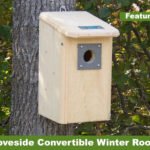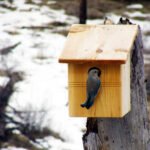Harsh winters can be difficult times for wild birds. Though the cold air does not physically affect them, birds often have a difficult time finding food, water and shelter during snow storms and frigid weather. For ardent bird enthusiasts looking to help wild birds brave the winter, there are a couple easy steps you can take to make life easier for birds.
Get a heated bird bath

Just like humans, water is an essential resource for birds’ survival. Not only do birds need to have drinking water accessible at all times, but bathing is an important routine for birds, because it keeps their feathers healthy. But, during the winter, when temperatures get extremely low, most natural water, such as lakes and ponds, freezes over.
In addition, unheated bird baths can easily freeze, eliminating yet another source of water for birds. That’s why getting a heated bird bath will significantly help wild birds during icy temperatures. For most backyards, elevated or mounted heated bird baths are great assets. In some situations, however, wild birds like ducks and turkeys, which typically thrive off lakes and ponds, are not able to locate water. If your backyard has these birds, ground bird baths with heaters are also important to own.
Keep the bird feeder full
Just like water, food can be a difficult resource for birds to locate during the winter. Even a few inches of snow can cover food that was once easily accessible to birds. That’s why it’s vital to make sure you have a good bird feeder and that it’s always full. Food is especially important for birds during the winter months, because it gives them the nutrition to burn more energy. Getting wild bird food that’s high in calories and high in fat keeps birds warmer. Oil sunflower, suet and peanuts are just a few types of bird feed that make fantastic winter food. Oil sunflower contains high protein and fat content making it one of the best winter seeds for birds.
Provide shelter
Despite the fact that birds’ feathers provide wonderful insulation, icy winds can still make things unpleasant. A birdhouse is a great way to protect birds from the severe winds. You’ll need to alter the size and shape of your bird house depending on the type of birds that frequent your backyard It’s also important to place your bird houses at strategic places.
Avoid placing birdhouses too close to one another and find spots that are out of the wind. If you’re looking to provide long-term cover for birds, planting specific kinds of plants and shrubbery also helps. For example, Evergreens offer shelter from the wind and have many limbs for birds to rest on. Other trees that work well are oaks, black walnut trees and chestnut trees.


